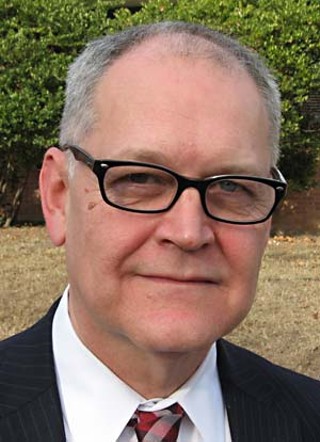The Insurance Industry Scam
A Q&A with whistle-blower Wendell Potter
By Richard Whittaker, Fri., Jan. 21, 2011

When Wendell Potter quit his job as vice president of corporate communications at health insurance giant Cigna in 2008, it looked like a regular retirement. A year later, his whistle-blowing testimony about how the insurance industry manipulates public debate rocked the Senate. On Jan. 7, Potter visited Austin to promote Deadly Spin, his book about his time shaping the anti-health care reform message. With the new Republican-dominated Congress threatening to repeal the reforms, he stopped by the Chronicle to discuss how spin doctors helped turn American health care into "one of the most irrational systems on the planet and one of the most inequitable ones." – Richard Whittaker
Austin Chronicle: Residents of countries with universal health care are often shocked by how it's portrayed in America. How important is it to the U.S. health care industry that its market-based approach is portrayed as the only workable system?
Wendell Potter: It's fundamental. We Americans have grown up with this system, and we don't really know different. We're told to be afraid of the system in the UK and in Canada. Those who have a special interest of keeping the status quo or make profits off our health care system don't want us to think that Britain can do something better than we, so consequently it's demonized and villainized and portrayed as being socialistic. "Socialism" is a word that is used with great effect in this debate because Americans have a mangled connotation. So it defines who we are because our health care system is so different, but it also makes it difficult to change things. People are accustomed to the way it is. A lot of people don't like it, but a lot of people who are insured, and that's the majority of Americans, are healthy through the majority of their lives, and so we don't really understand until we get sick just how inadequate our coverage can be. So it's not unusual to see public opinion polls that say 75, 85 percent of Americans are quite happy with the health care system here, but it's one of the most irrational systems on the planet and one of the most inequitable ones. But Americans have been persuaded to think America has one of the best systems on the planet, and I just heard the new speaker of the House making those same comments on the floor of the House yesterday as they're preparing what they're calling the "Job-Killing Health Care Reform Bill." It's just astonishing what they can get away with and what Americans will buy into.
AC: Opponents of health care reform have had remarkable message discipline, always sticking to the talking points. Where does that come from?
WP: Special interests that have a special interest in keeping the status quo. Sometimes it comes from the American Medical Association. Right now it's the insurance industry, which is in control of our health care system in ways that even the doctors are starting to appreciate, but most people don't really understand. It's incredible message discipline, and it's based on an understanding of ideology. The health insurers know that they need to be allied with big, well-researched organizations like the Chamber of Commerce. They want to be associated with people who can convince us that the way to go for health care is market-based. You're going to be hearing in the weeks to come, as we revisit health care, from Republicans and big business and those in the industry that what we need are "common-sense, market-based solutions." Those are carefully crafted words, just as what we have now was a "government takeover of the health care system." They spend enormous amounts of money very carefully selecting words and putting them together in a way that will elicit an emotional response. The people who are saying this believe their own talking points because they don't have an understanding of how the system is working or not working. If they are conservative, they think, "I'm supposed to believe this." They're supposed to believe that the market should work well in health care. They just simply have their blinders on and won't take them down to see the reality.
AC: The "death panels" myth was idiotic and insane, but it's astonishing how effective it was as a talking point.
WP: Those two words were brilliant. The reform advocates are intellectual, and they talk to other people who are intellectual, and they think that if you connect with someone intellectually, you've got the job done. Well, it just does not work that way. That term, "death panels," is similar to a phrase from a few years ago. When the Republicans wanted to get rid of the estate tax, they called it a "death tax." Change a word here or there, and you've got it done.
AC: The opponents of reform have been extremely effective at getting their terminology into the media. If it's so effective, why don't the supporters of health care reform have that sort of message discipline?
WP: They just don't seem to see the importance of effectively crafted communications. It's just baffling to me. When I came out of corporate America, you didn't go out in public without knowing your talking points, [or without] those talking points having been honed based on an enormous amount of research and craftsmanship by linguists. They do that because they understand how we are wired, and that we respond to messages that connect with us emotionally. The reform advocates think that if you can just lay out the facts, then people will just get behind you. But to lay out the facts, you have to go on and on and on with lengthy explanations that make people's eyes glaze over. People are much more responsive to a phrase like "this is a government takeover of the health care system" or "this legislation includes death panels" or "this is a job-killing bill."
AC: Why is there this skill disparity between the reform advocates and their opponents?
HP: One of the places that reform advocates have fallen short, at least in terms of strategy, is that they don't come out of the corporate world. In corporations, you don't do anything without a well-thought-out strategy and a business plan, and that's not something that advocates have skills to do or experience doing. So they get their asses kicked all the time as a consequence of it, and they don't have the resources or understanding of the power of language and how to put language together. The other thing is that it's more difficult to explain the advantages of something than to tear something down. You can easily call a 2,700-page bill a government takeover of the health care system, but it's a lot more of a challenge to explain the benefits, so you start at a disadvantage. Nonetheless, they still don't seem to understand that you can do something to persuade people to look certain ways, just by looking at how the other side has done it. During the debate, we kept hearing that this was a government takeover of health insurance. Well, it's not. That's a lie. What is the truth is that while we were not paying attention, we had a Wall Street takeover of our health care system. That might not be the best example, but I think you see what I'm saying. You can take a term like that, and I think it says a lot, and it can counter this "government takeover of health care." That's what they've not been able to do – they've not been able to counter it in an effective way. They've got to do it now. This is round two. I saw the president signing that bill as the end of the beginning, and this is going to be going on for a long time.
AC: The health care industry, including groups like the AMA, has done a great job of selling itself as an honest arbiter rather than a special interest group. How do you get people to think more critically about who is involved in the debate when their first instinct is to trust their doctor?
WP: Your messaging has to be perfect for your political strategy, and it has to be an integral part of it. And as part of that strategy, you have to build bridges and make allies among other groups. Health care advocates need to make sure that they are communicating with doctors for that very reason – that people trust their doctors. They hold doctors in very high esteem, much more so than they hold insurance companies, and the insurance companies know that, so they try to build bridges to the medical establishment. It's increasingly difficult for the insurers to do that because they don't like each other very much at all, and they haven't for a few years.
AC: A lot of people think that the communications and messaging industry is all either Mad Men or the Michael Clayton thing of corporate conspiracy. But it is increasingly a science, and it's very orchestrated, professional, and, to use a term, "corporate."
WP: The old joke is that people would say, "I want to go into PR because I'm good with people," and that's not the skill set you need. At a corporate level, it is an essential part of strategy, and the executives get that. They understand that you have to be very buttoned-up with your messaging, both defensively and proactively. You can get killed in the marketplace with respect to your competition, but if you want to influence public policy you've got to manipulate public opinion, to make sure that politicians are going to feel that they can side with you. The ultimate objective is to get the lawmakers to vote the way you want them to vote. Contributing to their campaigns is one way, and lobbying them is another. But what you've got to do is condition the electorate to think in a certain way so that they will go to the polls and they will vote for people that are saying what you think they will want to hear. You feed those talking points to them – you even find the candidates to put up for public office, you contribute to their campaigns – but a big part of it is making sure the public will think a certain way, so they will vote against their own self-interest and elect people to Congress who will vote the way the insurance industry wants them to vote.
AC: The critical failures of the U.S. health care market – the sheer number of uninsured and underinsured citizens, the high cost for low returns – are undeniable. It's reminiscent of the oil industry and how many executives would publicly deny the acknowledged threat of peak oil. Putting it simply, do people in the industry have trouble sleeping at night?
WP: Some people do, and I know that the people I worked with – some have reached out to me, and I know they are troubled by this. There's an entrapment that's part of the problem here. I was paid very well, but I wasn't independently wealthy, and I had to consider my own ability to make the house payments and the car payments and putting the kids through school. You also find that your ego and what you do for a living, you let it define you. How much money you make, what neighborhood you're able to live in, where you're able to send your kids to school, it all becomes part of your shell and your own self-identity. To do anything that will potentially destroy that is too frightening for people. It was certainly something I had to deal with, and I had to come to terms with the fact that I could lose all of that, whatever I had. I came to feel, well, I could lose it but what have I lost? A good friend of mine said, "Well, you can at least push a broom, can't you?" I didn't think I was going to end up pushing a broom, but I didn't have to have all of that stuff. But people are afraid of losing all that stuff because they're afraid of losing part of their identity. So, financially and psychologically and from an ego point of view, it's hard to separate yourself from something you've been involved in. Plus, you're afraid of losing your health care benefits. It's as fundamental as that. People are trapped in the job in many different ways.
AC: House Appropriations Committee Chair Jim Pitts recently told a tea party meeting that cutting Medicaid would mean throwing patients out in the street. You saw this room of "government-over-my-dead-body" types rock back in their seats. So how much of a chance is there for reform advocates to push back by swaying those grassroots?
WP: I think there is a chance. The advocates for reform, the people who understand that there is something really important at stake here, will understand that they've got to do something to save it. I was reading that Senator [Charles] Schumer of New York is making sure that on the Senate side they're really buttoned-up on ideas of messaging like they've never been before. Just before the Senate voted on this bill in 2009, I watched Senator Claire McCaskill of Missouri being interviewed, and she was asked, "What happened, Senator? You're voting on a bill that doesn't have a public option, which just a few months ago seemed to be a critical aspect of reform. What happened?" Very candidly, she said, "We lost the messaging battle," and I think at that moment there was an awareness that what they were voting on was far from what they thought they would be voting on, and a realization that they had been completely outfoxed when it came to messaging. I think they get it, and surely to goodness they have been anticipating what they'll be facing with this Congress. Surely we'll be seeing that they're going to be able to communicate in ways that they just didn't think were important or they just hadn't spent the time to do. I hope so.
Got something to say on the subject? Send a letter to the editor.








